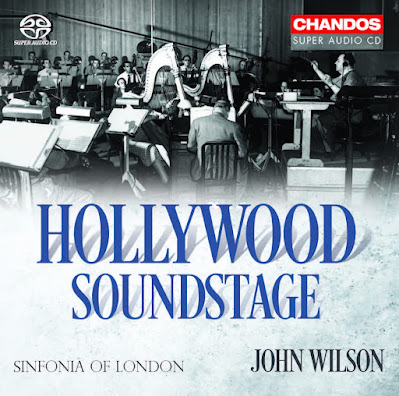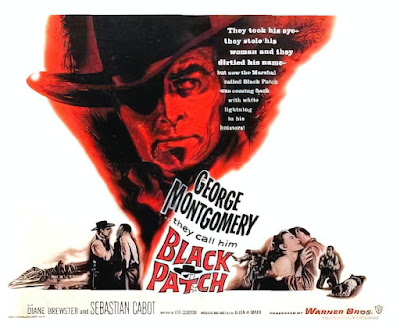Since 1994 the John Wilson Orchestra, with British conductor John Wilson at the helm, has become renowned throughout the world for their performances of music from the golden age of Hollywood and Broadway. In 2018, Wilson shifted focus and reestablished one of the most iconic orchestras in UK, the Sinfonia of London. The orchestra is best remembered for being on many great movie soundtracks, from “North by Northwest” to “The Snowman”. For this latest album, released in September on Chandos, John Wilson returns to the Golden Age of Hollywood.
The album begins with Erich Wolfgang Korngold’s stirring overture from “The Private Lives of Elizabeth and Essex” (1939). The piece consists of the typical Korngold fingerprints, such as regal and swashbuckling themes.
This is followed by David Raksin’s theme from “Laura” (1944), a piece which I think sounds ahead of its time. This recording features a superb trombone solo from Andy Wood and the piece consists of some wonderfully written variations on the main theme.
The next piece is the “Wizard of Oz” suite (1939), which consists of melodies from Harold Arlen’s songs as well as Herbert Stothart’s incidental music. It immediately transports you to those vibrant technicolour images in the MGM film directed by Victor Fleming, who also directed “Gone With The Wind”. The A-flat bicycle bell of Almira Gulch (a.k.a. the Wicked Witch of the West) makes an appearance.
Next is Frederick Loewe’s composition for both the stage (1956) and film (1964) versions of “My Fair Lady”. The film version of his “Transylvanian March” and “Embassy Waltz” is orchestrated by Alexander Courage, who is well known for writing the original Star Trek theme as well as orchestrating the film scores of composers like John Williams and Jerry Goldsmith.
Next is a suite from Max Steiner’s music to “Now, Voyager” (1942), which conductor John Wilson has arranged himself. I first heard performed live by the John Wilson Orchestra at the 2019 BBC Proms.
The next piece composed by Johnny Mandel is the main title from “The Sandpiper” (1965). Mandel is best remembered for composing the song “Suicide is Painless” (1970), the theme from “M*A*S*H”. The theme from the “Sandpiper”, also known as “The Shadow of Your Smile” features a brilliant trumpet solo perform by Mike Lovatt, former principal trumpet player of the John Wilson Orchestra.
Next is Franz Waxman’s suite from “Rebecca”, which was an Alfred Hitchcock film from 1940, his first American project. The score made use of two Novachords which was a form of early electronic instrument not dissimilar to a synthesiser. To recreate the sound on this track, Wilson uses modern keyboard instruments.
Finally, the street scene from “How to Marry a Millionaire” (1953) is Alfred Newman’s homage to Gershwin. I also think it also has traces of Charlie Chaplin’s score for “Modern Times” (1936), which Newman conducted and which David Raksin arranged with Edward Powell.
This SACD should be in the collections of all music lovers, even those are not keen on film scores. Also, I particularly like the brass playing on this album. The only criticism is… there should be more!
Acknowledgements…
Presto Music Classical Podcast: https://www.prestomusic.com/cl
Chandos Records: https://www.chandos.net/produc
Sinfonia of London: https://sinfoniaoflondon.com
John Wilson: https://johnwilsonconductor.co
Monday, 10 October 2022
Review: "Hollywood Soundstage"; John Wilson and the Sinfonia of London.
Saturday, 16 July 2022
Podcast: In Conversation With Timothy Brock
Thursday, 28 April 2022
Podcast: In Conversation With William Stromberg
In this episode, I talk to American composer, conductor and orchestrator William Stromberg. Who is renowned for his re-recordings of classic film scores.
This episode was recorded via Zoom on 24/04/2022.
Title music from “The Man” (composed by Jerry Goldsmith), courtesy of Roger Feigelson.
Tuesday, 22 March 2022
Review: New CD of Jerry Goldsmith’s Black Patch/The Man.
For many film score junkies, the name Jerry Goldsmith brings to mind a flood of memories and movie titles. He scored many great films such as “Patton”, “Star Trek: The Motion Picture”, “The Sand Pebbles”, “Chinatown” and “Total Recall” to name only a few. The vast majority of his work is available on CD and online. But earlier this month new recordings of two scores missing from his discography, were released by Intrada. His first theatrical film score for George Montgomery’s western, “Black Patch” (1957) and his 1972 score for Joseph Sargent’s political drama “The Man”. Both scores have been performed by The Royal Scottish National Orchestra under the baton of William Stromberg and have been painstakingly reconstructed by Goldsmith expert Leigh Phillips. The project itself was crowd funded through Kickstarter and I was one of hundreds who pledged their support.
The first score on the CD is “Black Patch”. The film was made in 1957, directed by Allen H. Miner and was produced by its star, George Montgomery. Despite being Goldsmiths first theatrical film score, the music is pure Jerry Goldsmith!!! And it features earworms that you will never forget!!! The first cue is the pre-credit music. It starts with a western style fanfare played on horns before we have the whole orchestra playing in unison.
Later on in the score, the action cue that was composed for a fight sequence is reminiscent of Goldsmith’s later scores, Such as “Total Recall”. It is played at around 130 beats per minute and makes use of brass, percussion, Piano and pizzicato strings. This will be of interest to many people, like me, who are unfamiliar with Goldsmith’s early works.
Tracks 19 and 20 are two different versions of the end title cue that features a tragic sounding love theme. Track 19 is an alternate arrangement made by Leigh Phillips. Compared to the original (Track 20) it is longer and has an ending that is less abrupt. I think that Goldsmith abruptly ended the original, because he was writing the score in time to the picture and the film came to an abrupt end.
The second score on the CD is “The Man”. The 1972 film made for ABC television, tells the fictional story of America’s first black president, Douglass Dilman, who is played by James Earl Jones. Although it is only a 15 minute score composed for a 90 minute film, it is still incredibly moving and powerful. It opens with a brassy, Copland-esque fanfare, which plays during the opening titles and throughout the score we hear variations on the six note motif that we heard during that title sequence.
The Lincoln Memorial and Oval Office cues are probably the most Copland-esque sounding pieces in the score. These are played when the newly sworn in President Dilman pays a visit to the Lincoln Memorial and then moves in to the Oval Office.
At the end of the film we hear a stirring rendition of “Hail to the Chief”, arranged by Goldsmith which runs into the closing credit music.
To conclude this review, the CD is a must listen!!! At the
moment the album is not yet available to stream and I hope Intrada will make it
available on streaming platforms in the future. As I think it is important that
more people get to hear these rarities. I should also add that this album is my
first Intrada album. Intrada is a brilliant organisation based in
California, that specialises in movie soundtracks and many of their releases
are limited editions that are sourced from original elements. I would like to pay
tribute to Douglass Fake and Roger Feigelson, Who have toiled to make this album
a reality. As well as William Stromberg for conducting, Leigh Phillips for
reconstructing the scores and the musicians of The Royal Scottish National
Orchestra for their top-notch playing. I would also like to pay tribute to
Intrada’s shipping manager, Jeff Johnson, who has toiled to have the CDs sent
to the many backers and film score junkies that are out there. And finally I
simply cannot wait for Intrada’s next project and I shall start browsing their
website for more film music rarities.
Buy the CD here: https://store.intrada.com/s.nl/it.A/id.12470/.f
Kickstarter project page: https://www.kickstarter.com/projects/129145902/black-patch-the-man-jerry-goldsmith-new-recording/description
This episode of “The Goldsmith Odyssey” has more info about
the project: https://goldsmithodyssey.buzzsprout.com/159614/9988703-production-report-black-patch-the-man-2021-intrada-recording
Monday, 28 February 2022
Podcast: In Conversation With Kim Criswell.
Saturday, 4 December 2021
Review: City Lights at Glyndebourne.
On Saturday November 20th, I travelled to the renowned Glyndebourne Opera House in Sussex, to see (and hear) one of Charlie Chaplin‘s masterpieces, “City Lights“ (1931). The film was projected on a big screen and was accompanied by Chaplin’s own original score. The music was performed by the Glyndebourne Tour Orchestra under the baton of Jamie Phillips, who was making his debut at the Opera House.
Chaplin started making “City Lights” in the late 1920s following a somewhat rocky period when he made “The Circus”. In 1927 the world’s first talkie, “The Jazz Singer,” was premiered in New York and cinema changed forever. By 1930, silent films were seen as obsolete but Chaplin was determined that “City Lights” would follow on in the grand silent tradition.
Chaplin composed his own musical score with the assistance of arranger Arthur Johnston. Chaplin could not read or write music in the conventional way and needed a professional musician’s help with the details.
Amazingly, I have never seen “City Lights” in full until now. The music was played brilliantly and the orchestra exceeded my expectations by managing to replicate the 1930s playing styles, especially with a high level ofvibrato in the strings, which I believe is crucial when performing such a score.
The audience genuinely appreciated the film and it got plenty of laughs. The hospitality of the venue was top-notch. The surroundings were beautiful - it was my first time at Glyndebourne - and the atmosphere was great. After the film finished the orchestra gave a brief encore. Then, after the concert I fortuitously bumped into TV and film composer Paul Lewis and his wife, Sharon, and had a nice chat with them.
Me (Left) with Paul Lewis (Right).
All in all, I had a splendid day, and had several firsts: first time at Glyndebourne, first entire viewing of “City Lights” on the big screen, and a first for hearing The Glyndebourne Tour Orchestra. I can only hope now, that Glyndebourne does even more of these screenings in the future.
Tuesday, 16 November 2021
Podcast: In Conversation With Tommy Pearson.
Review: John Wilson and his Sinfonia of London at Bridgewater Hall, Manchester (15/11/2023).
Once again, legendary British conductor John Wilson has been on tour presenting some of the greatest hits of Hollywood, with renowned sing...

-
In recent years, Intrada Records have used Kickstarter to fund their re-recording projects. This year, they have teamed up again with compos...
-
When I set up this blog, I originally wanted to talk about film music and film music only. However I have decided to make an exception to th...
-
Once again, legendary British conductor John Wilson has been on tour presenting some of the greatest hits of Hollywood, with renowned sing...









